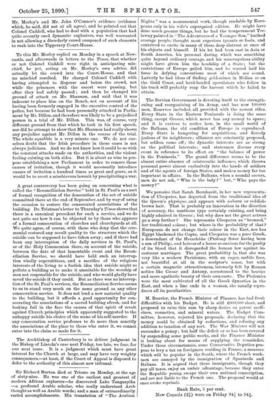To this Mr. Morley replied on Monday in a speech
at New- castle, and afterwards in letters to the Times, that whether or not Colonel Caddell were right in anticipating mis- chief, he yet, acting on Mr. Morley's own advice, did actually let the crowd into the Court-House, and that no mischief resulted. He charged Colonel Caddell with baying attempted to disperse and baton the crowd, not while the prisoners with the escort were passing, but after they had safely passed ; and then he changed his ground of attack on Mr. Shannon, and said that it was indecent to place him on the Bench, not on account of his having been formerly engaged in the executive control of the police, but because he had been personally attacked in Parlia- ment by Mr. Dillon, and therefore was likely to be a prejudiced person in a trial of Mr. Dillon. This was, of course, very different ground from that which he took in his first speech, nor did he attempt to show that Mr. Shannon had really shown any prejudice against Mr. Dillon in the course of the trial. The whole squabble is a very minute one. We do not our- selves doubt that the Irish procedure in these cases is not always judicious. And we do not know how it could be so with the constant attacks made on the authorities, and the violent feeling existing on both sides. But it is about as wise to pro- pose establishing a new Parliament in order to remove these causes of irritation, though it would necessarily introduce causes of irritation a hundred times as great and grave, as it would be to avert a mischievous lawsuit by precipitating a war.






































 Previous page
Previous page